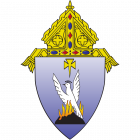
Diocese of Phoenix
Dear Catechists, Teachers and Faith Formators of the Diocese of Phoenix,
Greetings from Kino Catechetical Institute. I am thrilled to be able to announce our fully funded partnership with Franciscan University of Steubenville's online Catechetical Institute!
As you may know one of our diocesan initiatives is to find ways to use technology to support and advance the work of evangelization and catechesis here in the diocese. To that end, we have made the decision to fund this year-long partnership as a way to give every parish and school in the diocese access to the immense catechetical resources of Franciscan's online institute, online and free of cost!
Every parish and school in the diocese now has a one-year paid subscription, running through September 30th, 2024, which means you can register all those involved in evangelization, education, and faith formation at the parish, and begin taking advantage of the marvelous array of online workshops and catechetical tracks Franciscan has assembled.
These online workshops provide formation in a wide variety of topics relevant to the work of evangelization and catechesis in the Church today, and not only are many of the English language workshops available in Spanish, but there are many workshops presented in Spanish, and intended specifically for Hispanic Catholics, as well!
For certified catechists and Catholic school teachers, Franciscan Catechetical Institute's workshops are the preferred option for catechist recertification hours, and each workshop counts for 3 hours of formation toward recertification, but these content-rich videos are also great resources for adult faith formation, RCIA sessions, sacrament prep, formation of parents, and much more.
This is truly a one-stop shopping catechetical resource for parishes and schools, so please get all those involved in faith formation signed up and begin exploring how this magnificent resource can bless and build the good work you are doing.
If you have questions, or would simply like to know more about this partnership and how it applies to your parish or school, please reach out to me at [email protected].
May God bless each of you, and all the good work you are doing – pray for us, as we will pray for you!
In Christ,
Luz Lobato
Manager of Kino Catechetical Institute
Learning Tracks
The Church is the Body of Christ on Earth. The Church Christ founded is His continued history on Earth. The graces entrusted to her make possible an explosion of sanctity in the human family. The revelation of truth entrusted to her makes possible our secure return to the Father’s arms. The mission entrusted to her engages all human endeavors, and transcends all human failings, so that God’s Spirit can go forth to fulfill Christ’s promise to “make all things new” (Revelation 21:5). This workshop will explore God’s magnificent convocation of souls that we call the one, holy, catholic, and apostolic Church.
Mentorship is integral to ministry in the Catholic Church, as well as to life in the home. In ministry we are privileged to be able to participate in the Blessed Trinity’s divine and loving mentorship of every soul. In His gracious plan of salvation, God, our heavenly Father provides for us to receive all the guidance we need for our journey to Him, for our everlasting homecoming. Through the sending of His own Son and Spirit, He not only teaches us the Way to Him but also gives Himself to us to be our companion on this royal highway. The Church, the Body of His Son, formed by the Spirit, mothers and mentors us on this journey, and it is within this Body that each of us who are also called into ministry — whether as ordained members, as parents, or as lay catechists and pastoral associates — exercise a mentorship for those whom we serve. Our ministry, then, is a participation in His mentorship. Our ministry is one of the ways in which God makes this generous provision of mentorship for others.
The General Directory for Catechesis teaches that, “. . . the baptismal catechumenate . . . is the model of [the Church’s] catechizing activity” (90). We might wonder why Mother Church urges those who teach the faith to see the catechumenate (the RCIA process) as a model for all forms of catechesis. Mother Church urges this, because at the heart of the catechumenal process is a process of conversion. This workshop makes clear that the catechumenal process is slow and in stages. It also helps us understand that the catechumenal process is a progressive process, meaning it deepens with each step, so that individuals are brought into deeper communion with the Blessed Trinity and the Church. This workshop also offers guidance on how all forms of catechesis can follow the model of the baptismal catechumenate.
“The content of catechesis cannot be indifferently subjected to any method” (General Directory for Catechesis 149). Every good catechist seeks in some organized fashion to give growth to the seed of faith, to nourish hope, and to develop a deeper desire to love God and neighbor. In this workshop, we will explore a method that is highly suited to the goals of catechesis, and flows from a study of how the Church’s many catechetical saints sought to pass on the beauty, truth, and goodness of Christ’s saving revelation.
How do I know what to teach? How do I know what is essential? What can I not leave to chance that my students will get on their own? Many catechists are never helped and trained to go beyond pre-written outlines. They never discover how to take a piece of God’s revelation, a doctrine, and break it down in a way that answers these critical questions. This workshop explores how to identify the premise, essentials, common misunderstandings, related doctrines, and foundational Scriptures for the truths all catechists are called to pass on, so that each catechist can develop teachings that flow from his or her own deep grasp of the saving truths.
This workshop sharpens a few of your philosophical tools for teaching the faith. Philosophy, far from putting our lessons out of reach of our audience, actually appeals to the reason of those we teach; it helps us explain doctrine so that it “makes sense,” rather than just falling back on, “because I said so.” This workshop will provide examples of philosophically approaching the faith by exploring both a Catholic and a secular worldview, as well as what these two approaches mean for the human person, ultimately helping us prepare our learners to answer Jesus’ crucial question to His apostles and to each one of us, “Who do you say that I am?”
The General Directory of Catechesis says that, “Catechesis for adults, since it deals with persons who are capable of an adherence that is fully responsible, must be considered the chief form of catechesis” (GDC 59). Is this what most adult Catholics understand? Do most parishes orient sufficient resources to this endeavor? Do the methods employed in parishes reflect the best possible principles for adult learning, which differ from methodology employed for children and adolescents? This workshop will explore techniques to evangelize, catechize, and form faith in adults most effectively, given that the principle places of adult formation are in the family and in the parish.
Christ our Lord had wonderful times with his apostolic band – “You are my friends” (John 15:13) – and tough times as well – “How much longer must I be among you and put up with you!” (Luke 9:41). The volunteer catechists we have the privilege of serving alongside of and leading in ministry merit our best efforts in training and equipping them for the ministry to which they are called. This highly practical pair of workshops examines the type of person who volunteers to be a catechist, reasons for volunteering, where to find volunteer catechists, screening prospects, the dynamics of working together in a parish program, addressing problem situations which may arise among or with catechists. We offers specific practical strategies for forming and training catechists in four critical areas: human, spiritual, doctrinal and apostolic. The aim of this pair of workshops is to place integral formation of people at the top of the list of priorities of a parish catechetical leader, to make possible a successful sharing of outreach to any age in every parish.

